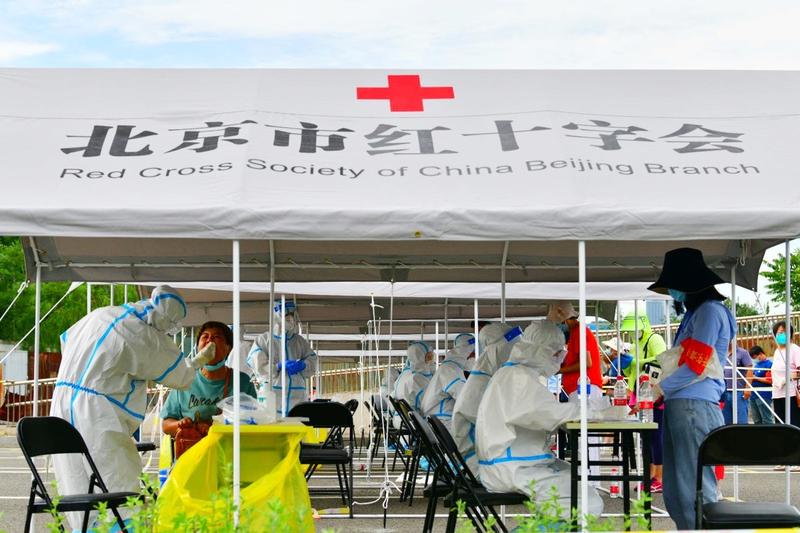As authorities try to complete testing for COVID-19, hot days make task difficult
 Medical workers collect samples for nucleic acid tests for novel coronavirus at a designated spot in Fengtai district, Beijing, on Monday. (FU DING / FOR CHINADAILY)
Medical workers collect samples for nucleic acid tests for novel coronavirus at a designated spot in Fengtai district, Beijing, on Monday. (FU DING / FOR CHINADAILY)
People lining up for novel coronavirus tests and medical workers in personal protective equipment taking throat swabs under the blazing sun have become common scenes around Beijing after a new cluster of COVID-19 cases emerged.
The majority of new infections emanated from the Xinfadi wholesale food market in Fengtai district, in the city's southwest. Before the new cases, the capital had gone 56 days without any locally transmitted cases of coronavirus.
To prevent a second wave of the outbreak, Beijing authorities required those who had visited the market since May 30 to be tested for the virus.
Most of the new cases have been traced back to Xinfadi, Beijing's largest fresh food market.
 Medical workers collect and drink water after working for hours at a testing station in Fengtai on Monday. (FU DING / FOR CHINADAILY)
Medical workers collect and drink water after working for hours at a testing station in Fengtai on Monday. (FU DING / FOR CHINADAILY)
Samples of the virus were discovered on chopping boards used to handle imported salmon at the market. People who work at fresh food markets and catering businesses around the city are also required to be tested for the virus before they can resume work.
As disease control and prevention workers have been busy verifying the details of those who have been in and around the market area, laboratories have been operating 24 hours a day to analyze throat swab samples. The city has 98 laboratories that can test about 90,000 samples a day, according to the Beijing Municipal Health Commission.
The Beijing government is aware that the sooner it can complete screening high-risk populations, the quicker the situation can be brought under control.
Of the 106 confirmed cases reported from June 11 to Monday, 65 were identified via nucleic acid testing.
 A medical worker's hands are disinfected at a testing spot in Fengtai on Monday. (FU DING / FOR CHINADAILY)
A medical worker's hands are disinfected at a testing spot in Fengtai on Monday. (FU DING / FOR CHINADAILY)
Most of the nucleic acid testing centers in Beijing have been set up outdoors in stadiums, exhibition centers or open spaces near residential areas. Some of the centers operate until midnight to ensure the tests are completed as quickly as possible.
Cen Yunpeng, 26, had a throat swab taken in a residential area in Fengtai on Tuesday. He had gone to Xinfadi market on June 3 to buy salmon for a family gathering to celebrate his birthday.
After the government urged people who had been to the market to come forward, he immediately contacted community workers. He was instructed to stay at home and wait for a nucleic acid test.
"I was told to go to the designated testing spot on Tuesday afternoon. The whole process was very organized. I can learn the result by scanning the QR code they gave me," said Cen, who is still waiting for his results.
 Wearing protective clothing and a face mask, He Yuanming, a member of the Beijing Blue Sky Rescue Team, is covered in sweat while working at Yueyuan community on Tuesday. (FU DING / FOR CHINADAILY)
Wearing protective clothing and a face mask, He Yuanming, a member of the Beijing Blue Sky Rescue Team, is covered in sweat while working at Yueyuan community on Tuesday. (FU DING / FOR CHINADAILY)
Beijing has been sweltering under a heat wave in recent days, which has made collecting samples sweaty and tiring work for medical workers who are required to wear personal protective equipment. The city issued a heat wave yellow warning for Sunday to Tuesday. Some medics had cases of heatstroke as the temperature hovered just under 40 C. "I only waited for about 15 minutes and I was sweating like a pig because of the heat. For the medics it must be like a steam room in those protective suits," Cen said.
After pictures of medical workers with heatstroke were posted on social media, many netizens left comments saying they were touched by their efforts to stop the virus spreading and praised them as heroes.
Liu Ning, a restaurant owner, moved four air coolers from her eatery to a testing spot in Miyun district on Tuesday. "The medics are here to protect us and I want to do something to protect them," Liu said.
By 6 am Monday, more than 193 testing spots had been set up around the city and more than 76,000 people had been tested, the Beijing Municipal Health Commission said.
 Medical workers take a break before continuing their work in the evening at the Guang'an Stadium on Monday. (FU DING / FOR CHINADAILY)
Medical workers take a break before continuing their work in the evening at the Guang'an Stadium on Monday. (FU DING / FOR CHINADAILY)
 Residents line up to receive nucleic acid tests at a designated spot in Fengtai on Monday. (FU DING / FOR CHINADAILY)
Residents line up to receive nucleic acid tests at a designated spot in Fengtai on Monday. (FU DING / FOR CHINADAILY)


